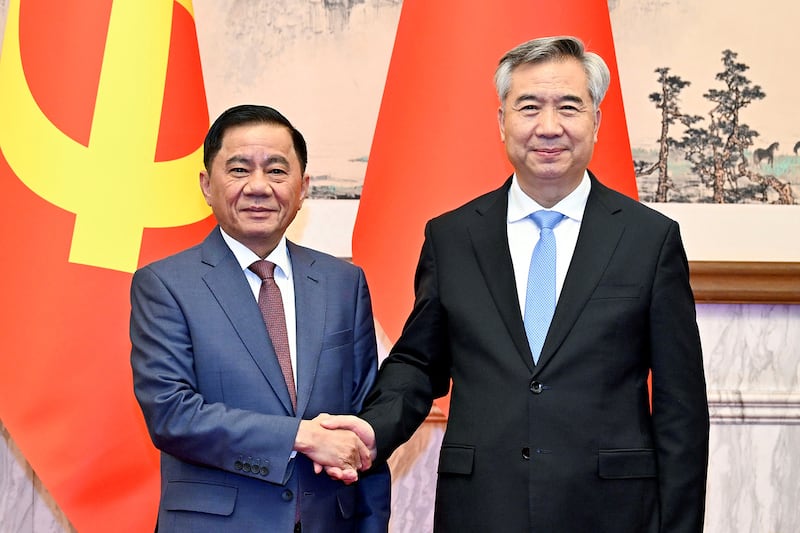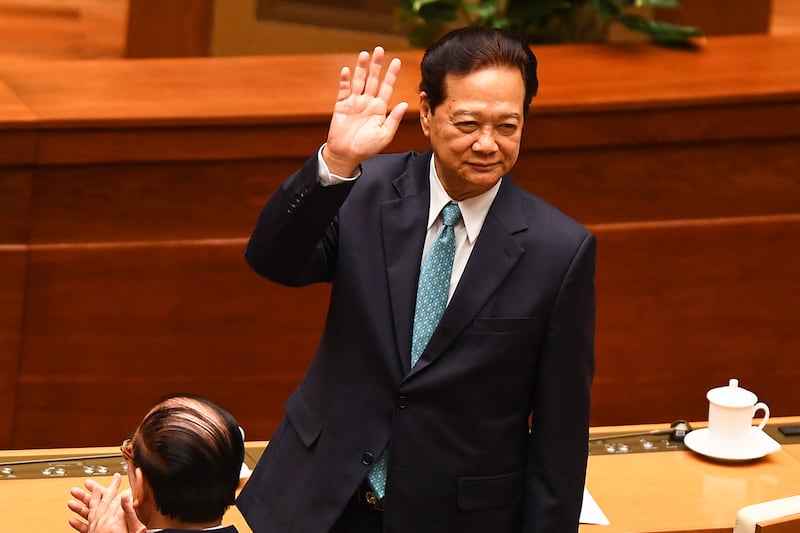Exactly one year ahead of the Communist Party of Vietnam’s 14th Party Congress, the Central Committee convened its 10th Plenum, where General Secretary To Lam further solidified his lock on the party.
There were a number of personnel changes in the convocation that started Sept. 18, 2024, the most important of which was the elevation of Lam’s longtime protege and former deputy minister of public security, Nguyen Duy Ngoc, to the Politburo.
Upon his election as general secretary, following Nguyen Phu Trong’s death in July 2024, Lam appointed Ngoc to be the head of the Central Committee Office.
This is not a sexy position, but it is the absolute nerve center of the Communist Party, responsible for setting up, drafting documents and agenda-setting for party plenums, as well as a host of other personnel issues. If one wanted loyal eyes and ears ahead of a party congress, the Central Committee Office is as good a place as any.
Lam did meet some resistance when he tried to quickly elevate Ngoc as the standing chairman of the Secretariat, when Luong Cuong was elected president in August 2024. There appears to have been some concern at the time that Lam was amassing too much power. But at the 10th Plenum, Ngoc was elected to the Politburo.
This is surprising, because under Party rules, one is only eligible to be on the Politburo after one full term on the Central Committee. Ngoc only joined the 13th Central Committee in January 2021.
That speaks volumes about the trust To Lam has in him, as well as the lock Lam has on the Politburo and the Central Committee.
RELATED STORIES
To Lam moves to secure full term at pinnacle of Vietnamese power
To Lam shakes up Vietnam with a government restructuring plan
Vietnam’s To Lam throws his drowning rival an anvil
Lam is governing with a sense of pragmatic urgency, fearful of falling into the middle income trap.
He is pushing ahead with a major government re-organization that will lead to roughly one-fifth of civil servants losing their jobs and 10 ministries being folded into just five. That shakeup is meant to improve government efficiency, and speed up decision-making.
But to get all that done, Lam needs to put in place loyal supporters of his agenda, and remove corners of resistance.

Agenda supporters needed
To that end, another big personnel announcement at the 10th Plenum was that Tran Cam Tu would relinquish his position as standing chairman of the Central Inspection Commission, or CIC, in order to concentrate his time and energy as a head of the Party Secretariat.
Tu has been seen as a potential impediment to Lam. As the head of the CIC he controls the one investigative apparatus focusing on central-level officials that Lam did not have full control over; and no one used anti-corruption investigations to take down rivals more effectively than Lam, himself.
Ngoc has assumed control over the CIC, while the Ministry of Public Security is firmly in the grips of another protege, Luong Tam Quang. Now both men are on the Politburo. Lam has control over the two key investigative agencies ahead of the 14th Party Congress, which will allow him to disqualify and neutralize rivals with dispatch.
The Central Committee’s Organization Commission, which is in charge of personnel issues for the Party, is already in the hands of another Lam loyalist, Le Minh Hung. Hung’s father, was a former minister of public security where he oversaw Lam’s rise.
Moving to the Secretariat is Deputy Prime Minister Tran Luu Quang, which adds a much needed voice with economic experience to the Party’s day-to-day operations center.
There are a few other things to note about the personnel choices.
This increases the number of Politburo members who came out of the Ministry of Public Security, currently seven out of 16, or 44%. That seems to reinforce the inherent insecurity of the Communist Party of Vietnam, or CPV.
Second, Ngoc hails from Lam’s home province of Hung Yen, creating an even greater concern about a provincial faction. If the Nghe An provincial faction was dominant a few years ago, they have been clearly supplanted by the boys from Hung Yen.
To Lam recently appointed another protege from Hung Yen to head Dong Nai province, who will likely be elevated to the Central Committee.
Third, the expansion of the Politburo makes some inherent sense for Lam going into the 14th Congress. The CPV is a conservative body and by tradition, no more than 50% of the body is replaced.
So we might see the gradual expansion of the Politburo in the coming year so that Lam has more wiggle room to push aside rivals. If he were able to get the Politburo up to 18, then the retirement of eight or nine would create the opportunity to clear out more dead wood.

Courting the South
Ahead of the 10th Plenum, though, was another event that had important political implications. To Lam awarded the highest party honor to former Prime Minister Nguyen Tan Dung.
Dung had vied to become the CPV General Secretary at the 12th Congress in January 2016, but lost to Nguyen Phu Trong. The two men despised each other.
Dung promoted a vision of growth based on market reforms. Trong saw that as not only a betrayal of socialist values, but as a policy that would enhance inequality and corruption, leading to the party’s loss of legitimacy.
Although out of central decision making, Trong could never make corruption allegations against Dung stick. Meanwhile, Dung quietly positioned his American-educated son for advancement. Now the minister of construction, Nguyen Thanh Nghi, was recently made the deputy party chief of Ho Chi Minh City.
Lam quickly and publicly courted Nguyen Tan Dung upon being elected general secretary. It was not just the simpatico of former Ministry of Public Security officials.
While Lam’s lock on the party apparatus is very strong, he has one shortcoming: Southerners are really under-represented on the Politburo and other central-level bodies. In part, this is because Trong really worked to purge the southern party apparatus, which he deemed as too free wheeling.
At present, only three of the 16 Politburo members are southerners — two are from the central region, while the remainder are northerners. Southerners are demanding greater representation on the 14th Politburo and Central Committee.
Key to winning southern support is Nguyen Tan Dung, the most politically connected and savvy politician in the south. As such, his son, Nguyen Thanh Nghi is likely to be elevated.
So while Dung’s Gold Star medal clearly signals the end of the Nguyen Phu Trong era, it also reflects the one key bloc that To Lam is actively courting so that he can put in place a leadership team of his making, not the traditional balances amongst factions and regions.
Zachary Abuza is a professor at the National War College in Washington and an adjunct at Georgetown University. The views expressed here are his own and do not reflect the position of the U.S. Department of Defense, the National War College, Georgetown University or Radio Free Asia.
